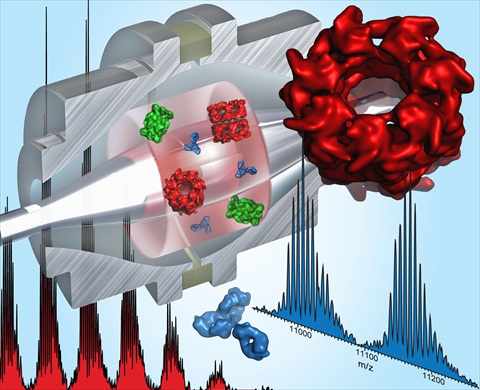Channels
Special Offers & Promotions
Novel mass analyzer unravels complex biomolecular structures
Essential for research and development of therapeutics
In Nature Methods the group of Albert Heck of Utrecht University introduces a new mass spectrometer based on Orbitrap™ technology. This high-sensitive instrument might play a crucial role in the development and use of therapeutic antibodies.The Heck group, in close collaboration with the research group of Alexander Makarov of Thermo Fisher, the inventor of the Orbitrap analyzer, show that protein assemblies of molecular weights over 1 million Da can be analyzed with very high analytical resolving power and exquisite sensitivity down to detection of single ions. The new mass spectrometer allows the measurement of a range of important proteins and protein assemblies allowing a detailed analytical footprint of these biologically and medically important molecules. Especially in the fast-growing arena of biopharmaceuticals (e.g. therapeutic antibodies) this new instrument will be important both in research & development and in quality control, to enable such molecularly complex biomolecules to be used safely in the clinic.
Heck: “The impact of the high mass resolving power at very high sensitivity as achievable with this new mass spectrometer is tremendous; it opens up avenues to measure not only protein-protein interactions, but also covalent and non-covalent binding of small molecules to protein assemblies. Wide-ranging applications may include the direct analysis of drug molecules binding to their targets, and the investigation of post-translational and chemical modifications (e.g. phosphorylation, glycosylation) on intact proteins and protein assemblies. I foresee that this instrument will become instrumental in the development and use of therapeutic antibodies, but also for instance in analyzing how drug molecules such as proteasome inhibitors do interact with their target, the proteasome”.
Makarov: “Presently Orbitrap mass spectrometry is probably the fastest growing mass spectrometric technique. Through this collaboration with Utrecht University we have opened up new avenues for the use of this mass analyzer. I always believed in the versatility of the Orbitrap analyzer, but am still amazed to see that we can now also mass analyze huge protein complexes, even whole viruses, with substantially improved resolving power and mass accuracy and sensitivity down to individual ions.”
This research was made possible by support of the Netherlands Proteomics Centre, and the EU-funded large scale facility PRIME-XS.
For more information contact Prof. dr. A.J.R. Heck, Biomolecular Mass spectrometry and Proteomics, 030-2536797 or 06 - 337 35 860, a.j.r.heck@uu.nl or Roy Keeris, persvoorlichter Universiteit Utrecht, 030 - 253 2411, r.b.keeris@uu.nl
Background on the analyses of therapeutic antibodies
Since the mid-1990s, antibodies have become an important class of drugs, with more than 28 antibodies approved for therapeutic use in the US and Europe. The need to improve clinical efficacy of antibodies further is continuously ongoing. Engineering of antibodies has enabled the design of antibody-based formats with tailored pharmacokinetics, avidity, (bi-)specificity and increased tumor penetration. Also modification of the N-linked glycosylation of monoclonal antibodies has also received interest as a strategy for improving the efficacy of therapeutic antibodies. Moreover, mixtures of antibodies, bi-specific antibodies and antibody drug conjugates are rapidly entering the therapeutic arena. Antibodies are large and complex glycoproteins (150 000 Da), and their complexity becomes only further enhanced by all the above mentioned new strategies. The essential detailed analytical molecular characterization of these therapeutics poses enormous challenges to the field of analytical chemistry. The technique of mass spectrometry surfaces as the key technology for such analysis, especially when it allows analysis at very high sensitivity, accuracy, speed and selectivity.
Biosimilar antibodies: Such analysis also become important for the identification and analysis of biosimilar antibodies that are copy versions of the original ones that will be out of patent in the next decade. It is not possible to produce exact molecular copies of antibodies, as they are produced from different cell clones undergoing different manufacturing processes. As a consequence micro-variations can be introduced that impact safety and potency. Only very small differences between biosimilar and reference mAbs, with reassurance that these are not of clinical relevance, may be accepted by health authorities. Copy versions of the original biopharmaceuticals are already available in several countries but no consistent worldwide requirements for their registration are established so far.
Utrecht University
Utrecht University is one of Europe’s leading research universities, recognized internationally for its high-quality, innovative approach to both research and teaching. Founded in 1636, the University has always focused strongly on research. Owing to its solid grounding in discipline-based scholarship, Utrecht University is at the forefront of developments in interdisciplinary knowledge. The University participates in various thematic multi-disciplinary collaborations that conduct excellent research. In the Shanghai Ranking, Utrecht University ranks 48th worldwide, 12th in Europe and 1st in the Netherlands.
Visit www.uu.nl for more information
Netherlands Proteomics Centre
The Netherlands Proteomics Centre (NPC) is a strategic collaboration of leading research groups from seven universities, four academic medical centers and several biotech companies. With a scientific programme addressing key areas of proteomics in several projects and specialized ‘research hotels’, the NPC performs high-quality research and knowledge transfer in an international context. The NPC is part of the Netherlands Genomics Initiative.
Reference
High-sensitivity Orbitrap mass analysis of intact macromolecular assemblies, R. J. Rose, E. Damoc, E. Denisov, A. Makarov, A. J. R. Heck, Nature Methods (2012) October 14th, 2012Media Partners



